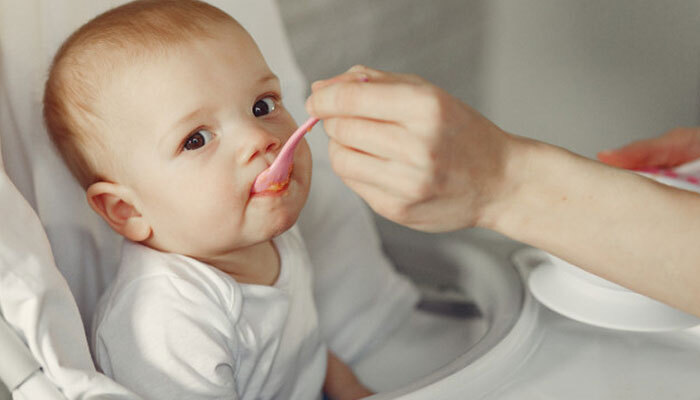When Do Babies Start Eating Solid Foods?
 Most newborn babies are prepared to begin eating solid food somewhere in the range of 4-6 months. Whether or not it’s an ideal opportunity to move to a different diet is a significant decision.
Most newborn babies are prepared to begin eating solid food somewhere in the range of 4-6 months. Whether or not it’s an ideal opportunity to move to a different diet is a significant decision.
Despite the fact that you may be anxious to get on board with feeding solids as early as possible, there are a lot of reasons why beginning an infant on solids too early isn’t the best idea.
Initially, the infant’s digestive system — from a tongue that pushes out to any substance set on it, to digestive organs actually missing numerous stomach-related proteins — is unready formatively for solids. Besides, solids aren’t required right off the bat — infants can fill all their requirements for the initial half-year of life from breast milk.
What Are the Signs Your Baby Is Ready For Solid Food?
- Your baby can hold its head well while sitting
- Tongue thrust reflex is reduced
- Your baby can easily move its tongue back and forth & up and down
- Your baby reaches out for food or show some interest in table food
How to Introduce Solid Foods to Baby
- Monitor Baby’s Mood

First feeding can be challenging for some babies. So remember that a child who’s bright and alert is bound to open wide for an approaching spoon, and one who’s testy or getting drowsy may need just breasts (or milk bottle). In case your infant is fastidious, be adaptable — you should skip solids at that particular meal and attempt them sometime later.
- Make Some Introductions

Before endeavoring to carry a spoon to mouth, put a spot of the food on the table or high seat plate and allow the infant to inspect it, crush it, squish it, rub it and perhaps taste it. That way, when you do approach with the spoon, what you’re offering will not be absolutely new to your baby.
- Don’t Rush

Food is never quick with regards to infants — you’ll be amazed at the amount of time it requires to get one spoonful into that little mouth. Give yourself and your infant a lot of time for feedings — and get a lot of training, as well. You’ll require it.
- Know When Enough is Enough

Realizing when it’s an ideal opportunity to quit feeding is pretty much as significant as realizing when to begin. A turned head or a gripped mouth are certain signs that an infant is done with this supper. Constraining an infant to eat is consistently an act of futility — and can really set up future food battles.
- Don’t Worry Too Much About Portions

In case that the greater part of what you serve your child winds up on the floor or in any case uneaten, it is anything but a reason for concern, besides any totally genuine stresses you may have over squandering food (and you can help save food by continuing to serve a small portion).
What are the Best First Foods For a Baby?
- Cereal

In case that you start with child cereal, pick a grain that’s iron-enhanced, whole grain like brown rice, whole grain oat, or whole-grain barley. To prepare, blend a modest quantity of whole grain bosom milk or even water to make a smooth “soup.”
Don’t improve the taste by adding things like squashed bananas, fruit purée, or juice — since it’s ideal to present just a single food at a time, on the grounds that it’s better for infants to obtain a preference for plain before you mix the oat bowl.
- Vegetables

Start with milder yellow or orange choices like sweet potatoes and carrots prior to proceeding onward to the green group, like peas and string beans, which have somewhat more grounded flavors.
In case that your child rejects what you give her, attempt again the next day and the following day, and the following. A few children should be acquainted with another food 10 to multiple times before they’ll acknowledge it, so determination is vital.
- Fruit

Delectable, digestible fruits incorporate finely pounded bananas, peaches, and pears. For something totally unique, and totally child amicable, start with smoothed-down or pureed ready avocado — it’s rich, yummy, and stacked with healthy nutrients.

